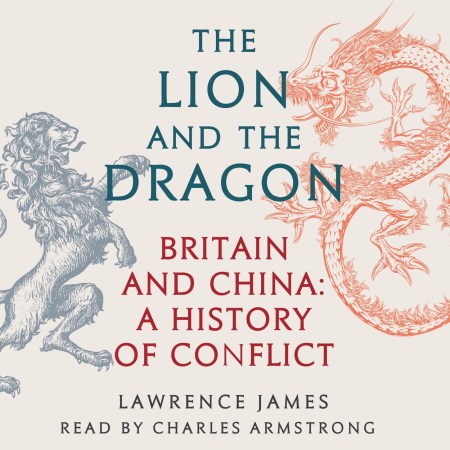Napoleon warned ‘Let China sleep; when she wakes, she will shake the world’. Lawrence James’s magisterial history analyses the relationship between Britain and China between the beginning of the Opium Wars in 1839 and the transfer of power in Hong Kong in 1997.
THE LION AND THE DRAGON reveals the part that Britain played in the awakening of China, then covers relations between the two countries during the period when an aroused China did indeed shake the world. Lawrence James also follows the parallel trajectories of four competitive empires – the British, the Chinese, the Russian and the Japanese – during the nineteenth and twentieth centuries, and then the fortunes of a fifth imperial power, the United States.
Successive British governments saw China as a source of wealth which needed to be protected. Local objections were seen off by force (the ‘Opium’ wars of 1839-42, 1856-7 and 1859-60) whose results proved that the Qing emperors could not protect their country. Indian troops were deployed in each campaign and manned Britain’s small garrisons in Hong Kong, Shanghai and other Treaty ports. Yet Britain never sought to make China into another India. Rather it allowed the emperors and their officials to govern, so long as they were docile and amenable to British needs. Paramount were the internal stability and fiscal responsibility that were the lubricants of trade.
A unified nation with economic and military muscle, and aware of its distant past as one of the great nations of the world, has been intent on reversing her recent history. Lawrence James vividly chronicles a time when this huge nation’s divisions encouraged foreigners to treat her as a treasure-house to be plundered at will. This warning from history explains why China’s present rulers brook neither dissent nor popular unrest.
THE LION AND THE DRAGON reveals the part that Britain played in the awakening of China, then covers relations between the two countries during the period when an aroused China did indeed shake the world. Lawrence James also follows the parallel trajectories of four competitive empires – the British, the Chinese, the Russian and the Japanese – during the nineteenth and twentieth centuries, and then the fortunes of a fifth imperial power, the United States.
Successive British governments saw China as a source of wealth which needed to be protected. Local objections were seen off by force (the ‘Opium’ wars of 1839-42, 1856-7 and 1859-60) whose results proved that the Qing emperors could not protect their country. Indian troops were deployed in each campaign and manned Britain’s small garrisons in Hong Kong, Shanghai and other Treaty ports. Yet Britain never sought to make China into another India. Rather it allowed the emperors and their officials to govern, so long as they were docile and amenable to British needs. Paramount were the internal stability and fiscal responsibility that were the lubricants of trade.
A unified nation with economic and military muscle, and aware of its distant past as one of the great nations of the world, has been intent on reversing her recent history. Lawrence James vividly chronicles a time when this huge nation’s divisions encouraged foreigners to treat her as a treasure-house to be plundered at will. This warning from history explains why China’s present rulers brook neither dissent nor popular unrest.
Newsletter Signup
By clicking ‘Sign Up,’ I acknowledge that I have read and agree to Hachette Book Group’s Privacy Policy and Terms of Use
Reviews
James' writing is always full of energy and animation; he has an excellent eye for revealing detail, and yet is not afraid to attempt the broad, magisterial sweep
James never loses sight of his grand design, yet he still finds room for the telling detail which illuminates and enriches a narrative
Fascinating . . . What helps The Lion and the Dragon to stand out is its brevity and brisk pace. A master of distillation, James covers just under 200 years of history in approximately the same number of pages. He does so while keeping his account broad and generally balanced . . . James's grasp of modern Japan's relationship with China is strong and - as with all his scholarship in this book - lightly worn . . . a pithy, eminently accessible study
Lawrence James is the doyen of Empire historians
With deceptive ease James charts the ups and down of Sino-British relations over the last 200 years in a highly readable 200 pages . . . Judicious and never dull, The Lion and the Dragon is essential reading
Other writers have explored particular aspects of Sino-British interactions, but James has come the closest to providing a continuous account of this relationship for a general readership . . . illuminating . . . a highly readable summary of the Chinese encounter with the whole of the modern world
James writes with energy and flair . . . an entertaining and accessible introduction
James can't write a dull sentence . . . Whether he is describing the Indian mutiny or the Suez crisis, the expansion of Africa or the little local difficulty in the American colonies, James has a genius for detail

